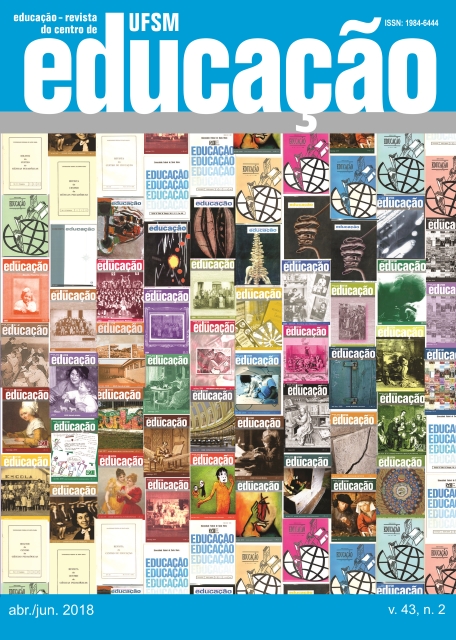Educação e complexidade: um diálogo possível
DOI:
https://doi.org/10.5902/1984644427228Palavras-chave:
Educação, complexidade, sujeito transdisciplinarResumo
Por supor que a filosofia de Paulo Freire se encontra impregnada de elementos de complexidade, um dos princípios da transdisciplinaridade, este artigo analisa as premissas do pensamento complexo identificando suas aproximações com os pressupostos freirianos, entendidos como elementos organizadores do conhecimento e estimuladores do espírito problematizador-criativo dos sujeitos históricos atuantes na educação brasileira. O estudo aponta elementos da abordagem transdisciplinar no pensamento de Paulo Freire por ele vislumbrar a educação como caminho de autonomia e libertação, a partir de um método de ensino entendido como campo de construção de conhecimento que incorpora a dimensão ontológica do ser humano e a prática educativa formadora de um sujeito transdisciplinar comprometido com a geração de novas estratégias articuladas ao bem comum em um processo contínuo de aprendizagem e de atuação política.
Referências
ALMEIDA, M. C. Complexidade, do casulo à borboleta. In: CASTRO, G. et al. (org). Ensaios de Complexidade. Porto Alegre: Sulina, 1997, p. 25-45.
ALMEIDA, M.C.; KNOBB, M.; ALMEIDA, A. M.(org.). Polifônicas Ideias. Porto Alegre: Sulina, 2003.
BETTO, F. Indeterminação e Complementaridade. In: CASTRO, G. (org.) et al. Ensaios de Complexidade. Porto Alegre: Sulina, 1997, p. 47-53.
BOHR, N. Física atômica e conhecimento humano: ensaios 1932-1957. Rio de Janeiro: Contraponto, 1995.
FREIRE, P. Papel da educação na humanização. Trad. Carlos Souza. Universidade do Chile, Santiago, mai./1967.
_______. Conscientização: teoria e prática da libertação – uma introdução ao pensamento de Paulo Freire. Ed. Moraes, 1980.
_______. O compromisso do profissional com a sociedade. In: Educação e Mudança. Rio de Janeiro: Paz e Terra, 1983.
_______. Pedagogia do Oprimido. 13a ed. Rio de Janeiro. Paz e Terra. 1983.
GADOTTI, M. Saber aprender: um olhar sobre Paulo Freire e as perspectivas atuais da educação. In: LINHARES, C.; TRINDADE, M. N. (orgs.) Compartilhando o mundo com Paulo Freire. São Paulo: Cortez: Instituto Paulo Freire, 2003, p. 107-125. (Biblioteca freiriana; v.7)
HEISENBERG, W. Física e filosofia. Brasília: Editora Universidade de Brasília, 4ª ed. – Edições Humanidades, 1998. (Série Métis).
MORIN, E. Epistemologia da Complexidade. In: SCHNITMAN, D. F. (org.). Novos paradigmas, cultura e subjetividade. Porto Alegre: Artes Médicas, 1996, p.274-286.
________. A noção de sujeito. In: SCHNITMAN, D. F. (org.). Novos paradigmas, cultura e subjetividade. Porto Alegre: Artes Médicas, 1996, p. 45-58.
_______. A ética do sujeito responsável. In: CARVALHO, E. A. et al. Ética, Solidariedade e Complexidade. São Paulo: Palas Athena,1998, p.65-76.
_______. Ciência com Consciência. 2ª ed., Rio de Janeiro: Bertrand Brasil, 1998.
_______. O Método I: a natureza da Natureza. 3ª ed., Portugal: Publicações Europa-América, Biblioteca Universitária, 1977.
_______. O Método III: o conhecimento do conhecimento. Portugal: Publicações Europa-América. Éditions Du Seil, 1986.
_______. Abertura. Complexidade e ética da solidariedade. In: Ensaios de complexidade. Coordenação de Gustavo de Castro (org) et. al. Porto Alegre: Sulina, 1997, p.11-12.
NICOLESCU, B. O manifesto da transdisciplinaridade. São Paulo: TRIOM, 1999.
_______. Para uma educação transdisciplinar. IN: LINHARES, C. e TRINDADE, M. N. (orgs.) Compartilhando o mundo com Paulo Freire. São Paulo: Cortez: Instituto Paulo Freire, 2003, p. 41-71. (Biblioteca freiriana; v.7)
SIMÕES, J. A ideologia de Paulo Freire. São Paulo: Loyola, 1974.
TORRES, C. A. A dialética hegeliana e o pensamento lógico-estrutural de Paulo Freire. In: Síntese, Nova Fase, no7, São Paulo: Edições Loyola, 1976.
Downloads
Publicado
Como Citar
Edição
Seção
Licença

This work is licensed under a Creative Commons Attribution-NonCommercial 4.0 International (CC BY-NC 4.0)
Declaramos o artigo _______________________________ a ser submetido para avaliação o periódico Educação (UFSM) é original e inédito, assim como não foi enviado para qualquer outra publicação, como um todo ou uma fração.
Também reconhecemos que a submissão dos originais à Revista Educação (UFSM) implica na transferência de direitos autorais para publicação digital na revista. Em caso de incumprimento, o infrator receberá sanções e penalidades previstas pela Lei Brasileira de Proteção de Direitos Autorais (n. 9610, de 19/02/98).
_______________________________________________________
Nome completo do primeiro autor
CPF ________________






